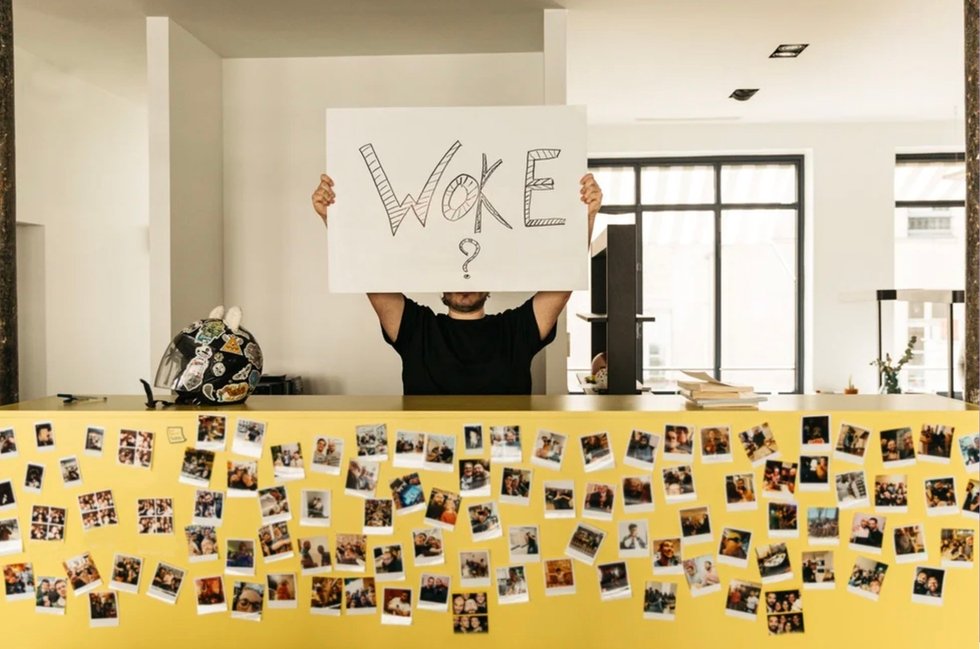How woke is too woke at work?
May 15, 2023
5 mins


Freelance translator and journalist
“Wake up!” Marcus Garvey urged the people of Ethiopia and Africa a century ago. The Jamaican political activist wanted to raise awareness of the systems putting Black people at a disadvantage in their own countries. In the 1940s, the term “stay woke” began to be used by those exhorting others to wake up mentally and stay aware of injustice. The term “woke” went mainstream after police killed Michael Brown in 2014 in Missouri and Black Lives Matter activists proclaimed “stay woke” to remind others to watch out for police brutality and similar injustices. The meaning of the term has evolved from staying awake to racial injustice to being aware of any social issue. Now, however, some say that the term “woke” creates division. So is it time to think again?
How pop culture affected the meaning of woke
In recent years, the term woke has been used by many of those on the left of the political spectrum to mean progressive, but also as a form of insult by many of those on the right. “Being woke initially meant an awakening of marginalized people, but woke has become a political term and has created division,” says Glen Guyton, who describes himself as a cultural competency navigator in San Antonio, Texas. He works with organizations to advance awareness and respect for those with different cultures or beliefs in the workplace. “Pop culture has used ‘woke’ too much,” says Guyton. “It’s so ridiculous and irrelevant that it’s not good anymore.”
Helen Jamieson, the managing director of Jaluch, a HR training and recruitment consultancy in the UK, agrees. Jamieson tells of an employee who wanted to learn more about the fully-covered Muslim women who worked in his department. “He asked HR if he could ask them questions about their faith in order to get to know them better as he felt they weren’t very included within the department,” says Jamieson. HR said no. He was told, “Don’t ask questions about religion as they will find that offensive,” says Jamieson. So he didn’t.
This was too woke, according to Jamieson. There’s a problem if we can’t ask our coworkers questions out of fear of offending them, she says. “How will we ever learn more about each other, our customs, practices, and beliefs?” she says. We shouldn’t look for offense where it doesn’t exist, she adds.
Guyton talks about a different kind of woke that’s become extreme. Some white people say their time in the sun has passed, but don’t understand their ongoing privilege. “This group doesn’t have the cultural lens to understand the complexity of marginalized people truly, but still they try to be allies. They try to be ‘colorblind’ or champions of marginalized people, but it is all about them,” says Guyton. They overcompensate and take on offenses of marginalized people to feel good about themselves and they pity others rather than offering collaboration. When this happens, ‘being woke’ loses its meaning. “They have turned woke into a pejorative when it was originally a term of positive social awareness, particularly in the Black community,” Guyton says.
Accepting different views
Another issue comes into play when employees take staying woke to an extreme level. “You disrespect someone by not accepting that people may have views different to your own,” says Jamieson. We won’t always agree with each other nor will we all have the same views, but what’s important is that we respect each other.
Not showing respect can hurt others. “When talking over someone or forcing our behavioral choices on others, especially done in a way that creates public embarrassment, [that] could be viewed as bullying,” Jamieson says. When someone repeatedly disrespects another, even for seemingly progressive reasons, they are bullying them in effect, she says. “To stop woke bullying, let’s focus away from the minutiae of diversity and inclusion, and instead focus on the wider topic of respect,” she adds. It comes back to the concept of giving due regard to the feelings and rights of each person.
Behaving like a mature adult
To help us to get an idea of how we should behave, Jamieson points to the transactional analysis theory, which states that we transact or communicate with each other in one of three ego states: parent, child, or adult. When we’re in the parent ego state, we tell everyone what they should do or think. We let them know if we disapprove of their behavior. In the child ego state, we respond with high emotion when we’re upset or when people behave unexpectedly. However, when we’re in the adult ego state, we take a balanced view of the situation and think before we speak or act. Jamieson gives an example of how a vegetarian could explain their views. They might say: “I’m a vegetarian. I’m happy to share why I am, so please ask if you’re interested and if you have views on diet and lifestyle choices, please share those too. We don’t have to agree, but I think it’s important we all feel comfortable to discuss and share,” she explains.
Parent and child ego states don’t encourage a culture of respect, and it’s possible that people in these states lean on the side of being too woke. According to Jamieson, “We have a society that to me appears to swivel between parent and child ego states and that becomes a self-perpetuating cycle of the behavior of tell and tantrum,” she says. Employees in these ego states are often too demanding or too accusatory. “However, if we create an adult ego state culture at work, then we will have more balance, more consideration, more thinking before we speak, and more respect,” says Jamieson.
Every organization has a work culture. What this looks like depends first on the leadership, which establishes appropriate behavior and speech. “Businesses and HR teams need to be educated before developing strategy, policies, and training, and understanding ‘woke’ is an essential part of that,” Jamieson says.
Woke label is limiting
Labeling people as “too woke” is limiting and can create problems too. “Alongside our knowledge about different cultures and beliefs and unconscious bias, we can also build knowledge about what is termed woke, ie learning about the social issues that are considered really important to some,” Jamieson says. It takes time, education, and critical thinking, but when we listen to the viewpoints of others and keep the lines of communication open, we can stay awake to the cultural issues affecting our coworkers.
Guyton, who consults on diversity, equity and inclusion, advises looking at the big picture when considering how to create an inclusive culture at work. Ask yourself: “What do we want to achieve and how do we get there?” he says.
Many of us spend a significant portion of the day interacting with coworkers and we may want to kid around with them. Guyton says, “It’s important to know the boundaries of others, but also your own, and communicate within those boundaries.” When our workplace isn’t too woke, making jokes can be acceptable so long as they come from a place of respect and understanding. There is no place for demeaning, sexist, or racist jokes. “Learn and gauge people – a relationship must be there before the joke,” Guyton says.
The word woke has been criticized recently, but its original concept is what we need to focus on now. “We all need to be awake and aware,” says Guyton. “What you call this is your choice because it’s not the term that matters, but what we hope to accomplish.”
Photo: Welcome to the Jungle
Follow Welcome to the Jungle on Facebook on LinkedIn and on Instagram and subscribe to our newsletter to get our latest articles every day!

More inspiration: DEI

Sh*t’s broken—Here’s how we fix work for good
Built by and for a narrow few, our workplace systems are in need of a revolution.
Dec 23, 2024

What Kamala Harris’s legacy means for the future of female leadership
The US presidential elections may not have yielded triumph, but can we still count a victory for women in leadership?
Nov 06, 2024

Leadership skills: Showing confidence at work without being labeled as arrogant
While confidence is crucial, women are frequently criticized for it, often being labeled as arrogant when they display assertiveness.
Oct 22, 2024

Pathways to success: Career resources for Indigenous job hunters
Your culture is your strength! Learn how to leverage your identity to stand out in the job market, while also building a career
Oct 14, 2024

Age does matter, at work and in the White House
What we've learned from the 2024 presidential elections about aging at work.
Sep 09, 2024
The newsletter that does the job
Want to keep up with the latest articles? Twice a week you can receive stories, jobs, and tips in your inbox.

Looking for your next job?
Over 200,000 people have found a job with Welcome to the Jungle.
Explore jobs